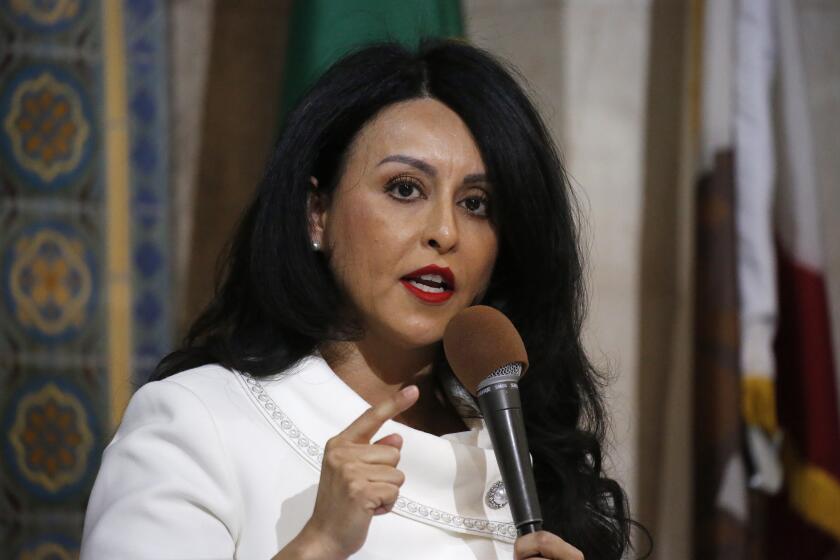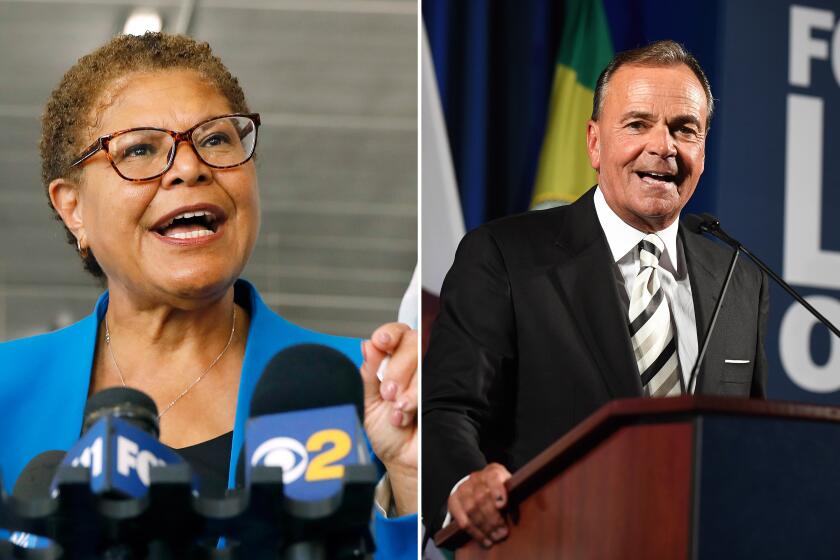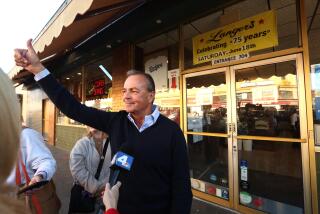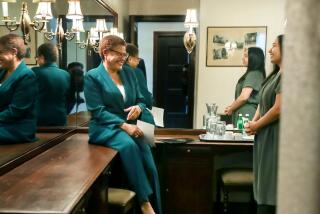Caruso on track to exceed $100 million in campaign spending
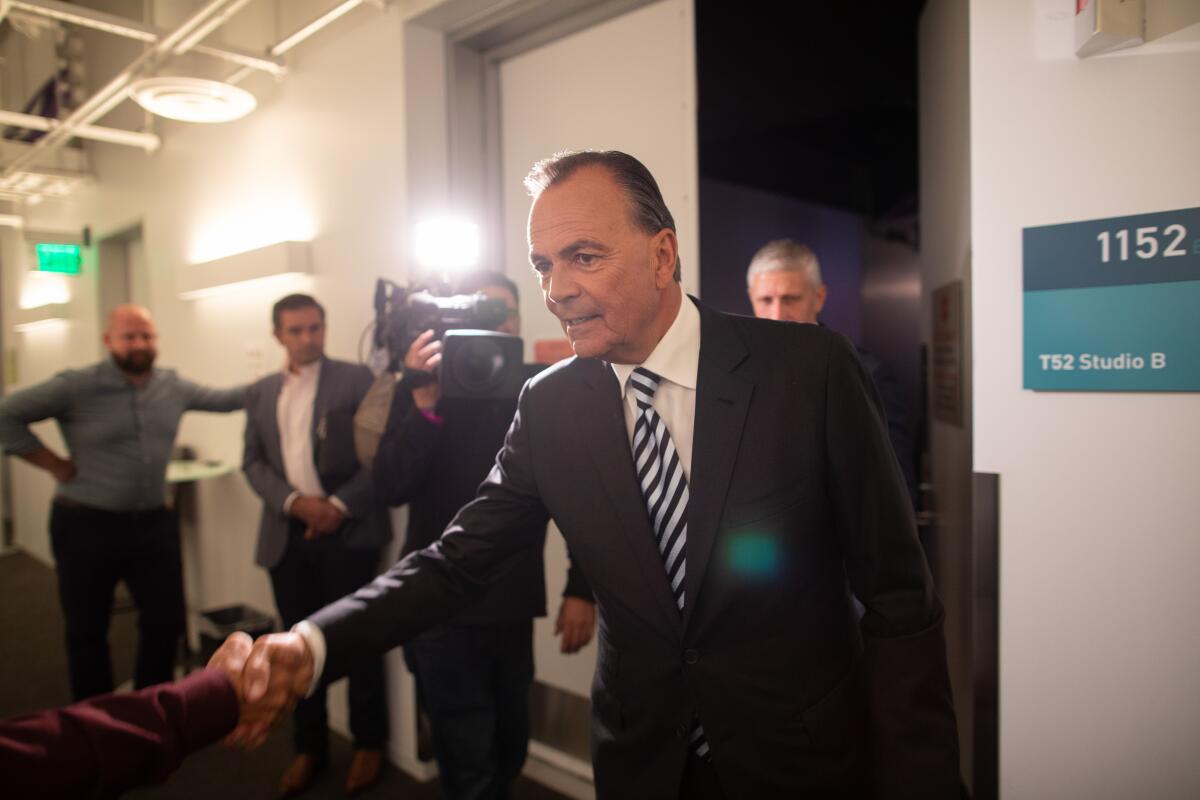
- Share via
Rick Caruso is on track to spend more than $100 million by Nov. 8 in his bid for Los Angeles mayor, an astounding sum that puts the real estate developer on par with candidate outlays in some of the country’s most closely watched and expensive midterm races.
With just over a week remaining before election day, a new set of campaign finance disclosures offers fresh details on how Caruso and his opponent, Rep. Karen Bass, are allocating their resources in the waning days of the campaign.
The records, which were released late Thursday and cover a 28-day period from Sept. 25 to Oct. 22, also illustrate how the Caruso campaign has drastically accelerated spending in recent weeks.
Here’s who has raised the most money, and where it’s coming from, for the Los Angeles Mayoral race ahead of the 2022 election
The disclosures come at a critical moment in the fight to lead the nation’s second-largest city. Bass finished first with a 7-point lead in the June primary, and polling showed the longtime lawmaker widening her lead over Caruso through much of the summer. But the race is widely believed to have tightened in the fall, as Caruso went back on TV and the candidates faced off in a series of debates.
Both campaigns were thrown off-kilter this month, after The Times reported on an incendiary leaked recording of three City Council members and a top labor leader. The ensuing fallout put an international spotlight on race relations in Los Angeles and scandal at City Hall, with still-evolving ramifications for the mayoral race.
Audio of Councilmembers Nury Martinez, Kevin de León and Gil Cedillo speaking with labor leader Ron Herrera quickly became a new and incendiary issue in the Nov. 8 election.
But amid the chaos, one thing has remained constant: Caruso has continued to pour previously unthinkable sums into his campaign.
The developer’s record-breaking spending has topped $92 million since he launched his candidacy in February, according to records submitted to the Los Angeles City Ethics Commission. Nearly a third of that outlay — roughly $29.5 million — was spent during the last filing period. All but a small fraction of Caruso’s total spending has come out of the billionaire’s own pocket.
The Caruso campaign spent a little more than $1 million a day on average during the 28-day period covered in Thursday’s filing. Should Caruso continue spending at this rate, his total expenditures would likely exceed $108 million by election day.
Bass also accelerated her spending during the latest filing period, albeit along far smaller margins. The congresswoman spent about $2 million from Sept. 25 to Oct. 22, which is nearly double what she spent during the previous roughly 12-week period.
Bass also took in a little more than $710,000 in contributions and received $1,027,200 in city matching funds during the most recent filing period.
Nearly three-quarters of Bass’ spending during the last month went toward TV airtime and production costs. Bass is slated to spend more than $4 million in total on advertising through the primary and general elections, with most of that sum going toward airing a single TV ad that depicts her as a battle-tested leader who has successfully navigated various crises as a lawmaker.
Caruso’s deep pockets give him a massive advantage in the city’s ad wars: The developer is slated to spend more than $53 million through Nov. 8 on a months-long barrage of TV, radio and digital ads, according to data from media tracking firm AdImpact.
Rick Caruso is expected to spend more than $53 million on advertising in the L.A. mayor’s race, far outpacing his opponent, Karen Bass.
“That’s statewide ballot measure spending,” Paul Mitchell, a Democratic strategist and political data expert, said of Caruso’s projected $100-million-plus outlay.
Caruso’s expenditures also put him in league with candidate spending in some of the nation’s most hotly contested national congressional races. But, Mitchell said, “dollars don’t go as far in L.A. as they do in other parts of the country.”
Los Angeles is a particularly expensive media market, and network TV ad buys will extend far outside the boundaries of the city, Mitchell said.
Caruso spent nearly $7 million on TV airtime and production costs during the most recent filing period.
Those media costs include a $900,000 in-kind contribution to a political action committee that Caruso formed in late May to support Proposition 1, a ballot measure that would explicitly enshrine abortion rights in the state Constitution.
The in-kind donation to the committee — along with a $100,000 contribution Caruso made last week — closes the loop on a $1-million pledge the developer made in the spring. Bass had critiqued Caruso at the beginning of the month, when he had yet to put any money into the committee.
The Caruso campaign also spent about $3.5 million on canvassing during the most recent filing period, bringing its total investment in field work ahead of the general election to a little over $13 million.
Mitchell said he wasn’t aware of any individual state or congressional race in the country where such a sum was being spent on field efforts.
There is certainly no precedent for such a massive canvassing program in an L.A. candidate race, but the campaign is banking on the hope that a gargantuan investment in multilingual door-knocking can help push voters who often sit out local races to the polls.
“If it shows to be effective, it could end up breaking a lot of what we expect campaigns should be spending money on,” Mitchell said, describing the kind of culturally specific field programs that can be built with such large resources.
More to Read
Sign up for Essential California
The most important California stories and recommendations in your inbox every morning.
You may occasionally receive promotional content from the Los Angeles Times.

